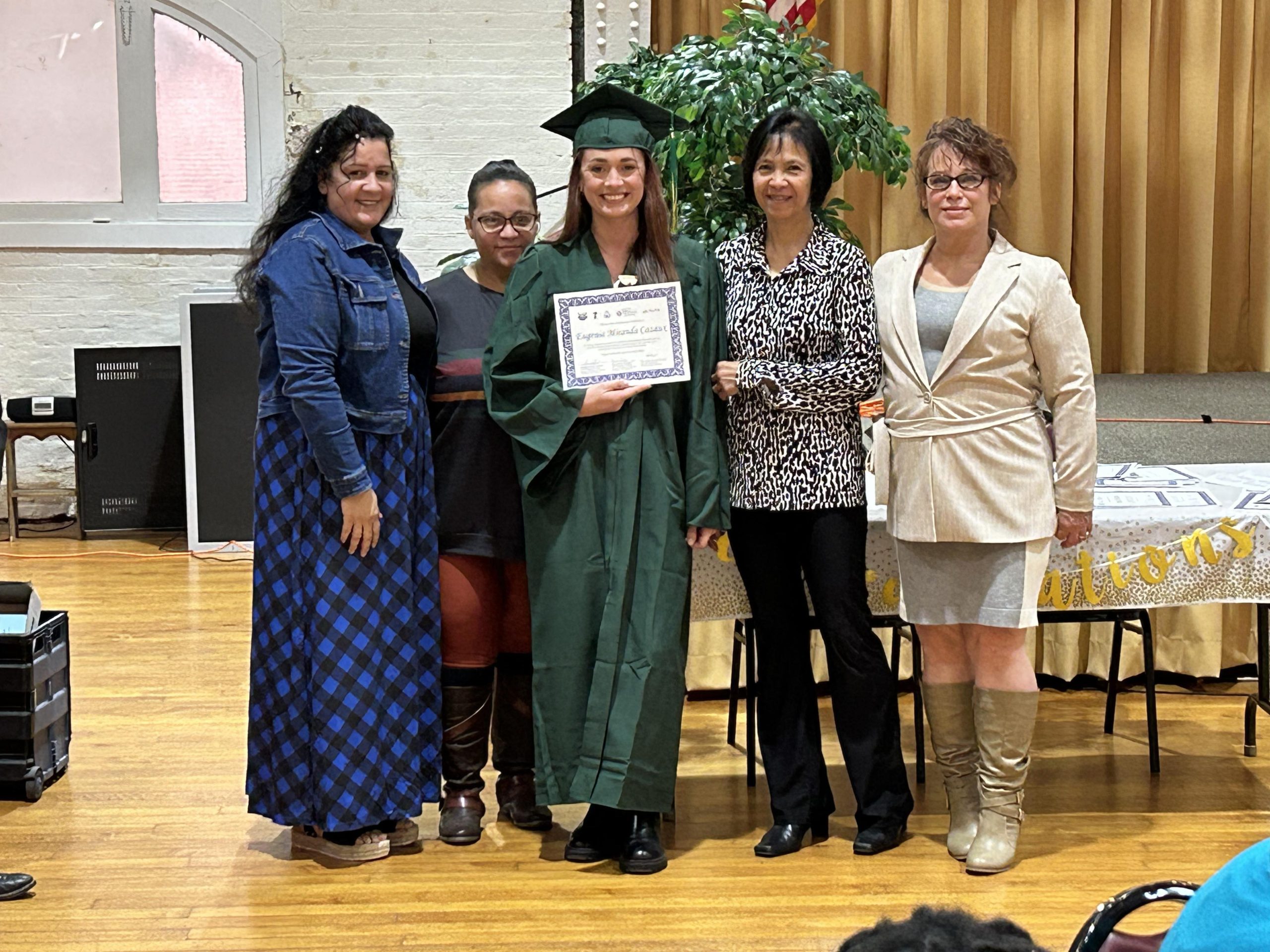In lots of training programs, a presenter talks to a room full of people, and then, at the scheduled time, everyone goes home.Â
But there are some training programs that invite everyone involved to solve big problems, make the world far better than it is, and keep doing so long after the program ends.
That’s what the Family Child Care Entrepreneur Training Program in Fitchburg, Mass., does. Nominally, this program trains participants to complete the licensing process for becoming a family child care provider in Massachusetts.
But what this program is actually doing is building a professional community of early educators who can support each other and serve young children, working parents, and the Fitchburg, Mass., community for years to come.
Partnering with the Federal Reserve Bank of Boston
To launch the program, Marites MacLean and Beth Robbins applied for and received funding from the Federal Reserve Bank of Boston’s Leaders for Equitable Local Economies, or LELE, initiative.
LELE’s goal was to support “leaders taking on the critical work of rebuilding economic systems in Massachusetts’ smaller cities.â€
In Fitchburg — and Massachusetts — the need for child care was glaring. The pandemic had closed hundreds of child care programs across the state, turning the ongoing shortage that existed before the pandemic into a crisis.
MacLean and Robbins, both graduates of the New Vue Communities’ Stewards Leadership Training Program, were eager to tackle this problem. MacLean has three decades of experience as a family child care provider, advocate, and coach. Robbins has extensive experience in nonprofit work and systems change.
“I knew I had to do something to elevate the field of family child care,†MacLean says. “And I knew it was hard for people, especially members of immigrant communities, to manage the licensing process.â€
The training program was launched in March 2022, offering an eight-week, bilingual program in English and Spanish.
One participant is Jenny Pierre, a nurse who owns a home health aide program, who learned about the family child care training program on Facebook. A Haitian immigrant herself, Pierre knows how much immigrant families struggle to find child care for their children. So she enrolled in the family child care training program to see if she could help the community.
The best part of the program? “It was the way they supported me,†Pierre says. “They partner you with other students. They give you all the information you need.â€
Pierre is working on earning her license, and as the training program grows, she’s also helping to provide translation services in her native language, Haitian Creole. And there is a funder who is interested in supporting this effort.
Scarlett Sanchez signed up for the training program so she could help a friend who wants to open a family child care program and who is also enrolled in the program.
“I learned a lot about the licensing process,†Sanchez says. “It can be really confusing when you’re doing it by yourself, and this program has helped my friend and me to get our licenses by going step by step. One of the program graduates also helped us understand the pre-inspection process, helping us understand if we’re on the right track or if we need to fix something.â€
“This isn’t just a training program,†Sanchez adds. “It’s a resource. We enrich each other by sharing our experiences.â€
Both Sanchez and her friend have graduated from the training program and they expect to open a family child care program later this year.
Currently, Sanchez invests back into the program by helping with Spanish/English translation during training sessions. And whether it was as a participant or now as a translator, Sanchez says she is always learning something new.
A key feature of the training program is that it adapts and grows to meet participants’ needs. Adding more languages is one example. Robbins shares another, explaining:
“One of the things we’re finding is that the program not only helps people walk through the process of getting their family child care license, it also educates them about and connects them to resources, including ways to continue their education.
“A number of people have come from their home country and they might already have their masters in teaching or various other levels of education. We help connect them to the right people so that they can transfer those credits over.â€
That was Jehimy Morales’ experience. She is the mother of a special needs child, and she enrolled in the program, earned her license, and received help continuing her college education.
“At this moment, I have 18 credits,†she says in Spanish, “and I’m continuing with my studies.â€
The best part of the program, Morales adds, “is that they haven’t let us go. We always have someone on the other side of the phone whom we can ask questions. They’re always available to help us and provide us with information. And even after they have helped us earn our license, they keep helping us work with kids and keep things running.â€
This long-term support is provided by two bilingual coaches who are seasoned family child care providers. Program graduates also stay connected on WhatsApp and through a Facebook group.
Recently, the training program graduated its sixth cohort, creating a larger community of family child care professionals who can serve families and support each other. Robbins is developing new programs to keep the graduates in touch and engaged, which is an important way to provide support and overcome the isolation that providers can face.
Through a partnership with Empower Children for Success, the training program has also helped its graduates access start-up funding from the city of Fitchburg and from Empower Children for Success. To offer these grants, Empower Children worked with the United Way, Community Foundation of North Central MA and the Greater Worcester Community Foundation.
But the training program’s most important outcome is empowering the program participants, Robbins explains.
“Our participants are stewards. They become part of the community. That’s the key that isn’t easily replicated: It takes a team of people who are all committed to the same mission. We’re mission led, and that includes Jenny and Scarlett and Jehimy,†Robbins says of the program participants, “who have all stepped up as leaders in this program.â€
Much more to do
MacLean and Robbins want to expand the program to help replace more of the 450 licensed Massachusetts providers who closed down permanently after the pandemic hit. To do this, they are looking for sustainable sources of funding, and they are actively speaking to a number of donors now and drawing on guidance from the Federal Reserve Bank.
To secure more funding, MacLean worked with the Seven Hills Foundation, the fiscal sponsor for the LELE project, to discuss applying for a Synergy grant from the Health Foundation of Central Massachusetts. Seven Hills applied as the lead agency and was awarded a grant for $255,000 that will be used to fund planning for the Family Childcare Success project. The goal of this project is to increase the number of linguistically and culturally responsive family child care businesses in Central Massachusetts. To accomplish this, the project will merge the Childcare Entrepreneur Stewards Training program with Project Flourish, an apprenticeship program offered by the Center for Childcare Careers at Family Services of Central MA.
There’s also important advocacy work to do. MacLean would like to see family child care providers have more access to funds they could use to improve their facilities or even rent spaces to run their businesses in. She praises a new state program that will award $14.3 million in grants for “early education and out-of-school time facilities that serve low-income families,†including family child care providers.
Eager to see a long-term solution, MacLean is working with lawyers from Goodwin Procter to draft legislation that would create sustainable funding. And, she says, “I’ve already spoken to our state legislators about how we can put a line item in the budget for this program,†MacLean says.
Summing up the challenges and looking ahead, MacLean is optimistic.
“I tell all our participants that this is a very exciting time to become a family child care provider, because now everybody is paying attention and putting money into expansion and growth for early childhood education.â€



Well done Marites MacLean and Beth Robbins!
[…] here to read the […]